|
|
1934 World's Fair
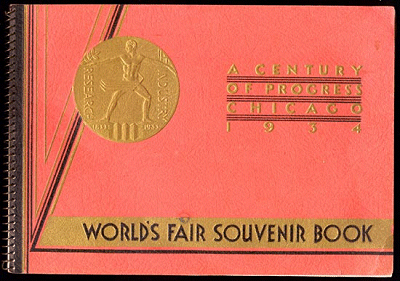
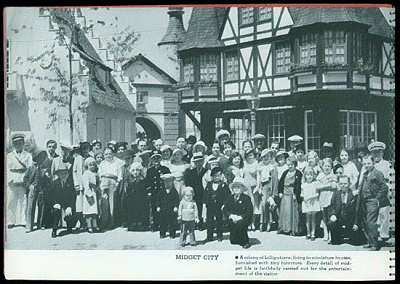
World's Fair
A Century of Progress
Chicago 1934 souvenir book
64 spiral-bound pages, 1934
In 1934, the eyes of the world (that is, those that weren't otherwise occupied with the Great Depression and what was happening
in Germany) were turned to the World's Fair in Chicago, the theme of which was A CENTURY OF PROGRESS.
Hmmm… if by ‘progress’ you mean more effectively packing little people into convenient leather carrying cases, then I say, “Well done,
century concluding in 1934! You've come a long way, baby!”
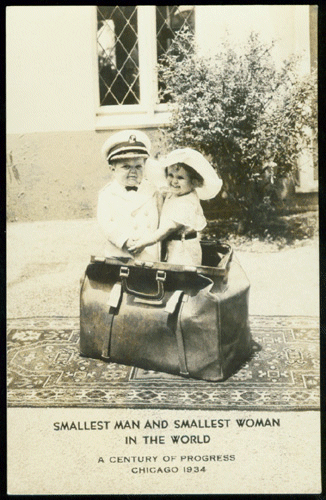
Smallest Man and Smallest Woman in the World
real photograph postcard, 5.25 x 3.25 inches, 1934
signed in pencil on reverse: "Margaret Ann Robinson" and "Capt.
Werner"
photographer: unknown
Apparently, no World's Fair was complete without a midget
village, or in this case a whole "Midget City", which graces page 32
of the brochure. The caption reads:
A colony of Lilliputians, living in miniature houses, furnished with tiny furniture. Every detail of midget life is faithfully carried out for the entertainment of the visitor.
One can almost hear the patrons exclaim, “Golly! Isn't that swell? Every detail of midget life… ain't that something? The cute little fellas do everything we do, only smaller and more entertaining.”
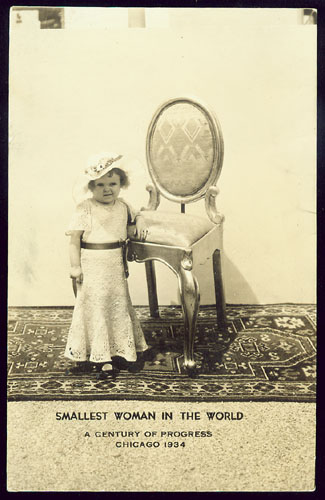
Smallest Woman in the World
real photograph postcard, 5.25 x 3.25 inches, 1934
signed in pencil on reverse: “July 7th 1934, Margaret Ann Robinson, 18 years old, 18 3/4 [inches] tall, Weighs 19 lbs.”
photographer: unknown
Margaret Ann Robinson and Captain Werner (why not commodore?), by merit of their extreme tininess, were evidently the leading citizens of Midget City.
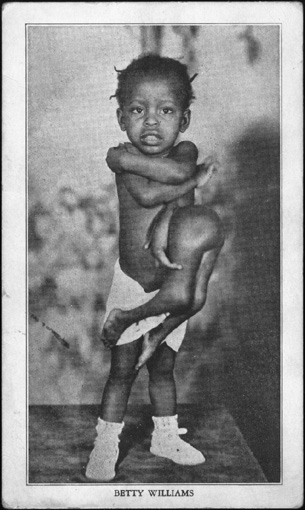
Betty Williams
postcard, 5.5 x 3.25 inches, 1934
printed on reverse: Official Post Card of RIPLEY'S “BELIEVE-IT-OR-NOT” ODDITORIUM
A CENTURY OF PROGRESS – 1934
photographer: unknown
Also indicative of one hundred years' worth of progress was a new feature unveiled at the 1934 World's Fair: Robert Ripley's very first Odditorium. Ripley, a syndicated cartoonist who was already well known for his Believe-It-Or-Not
feature in newspapers and radio (long before the television incarnation), featured a number of interesting anatomical oddities that year. Among the most spectacular was the infant Betty Lou Williams, who had a parasitic
twin sister emerging from her torso. Ripley billed her as The Girl with Four Legs and Three Arms, and declared that x-rays showed the “perfectly developed” head of her twin resting within her abdomen.
Betty Lou was born Lillie B. Williams on 10 January 1932 to a poor family in Albany, Georgia. At the tender age of two, Ripley paid Betty Lou's parents $250 a week for the priviledge of exhibiting her.
She would go on to have a long and successful career in the sideshow, amassing enough money to send all twelve of her siblings to college. Despite doctors' predications that she would likely live a long and healthy life,
Betty Lou died in 1955 due to complications following an asthma attack.
My tribute to Ms. Williams, Olympia (Betty Lou Williams) may be seen here.
|

|

|

|
All Images and Text © James G. Mundie 2003 - 2010
|





